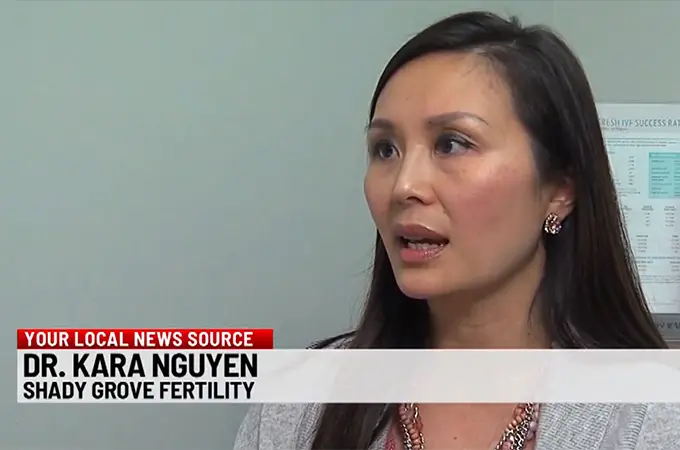At 42, Tammy Brown is financially secure, has a great career, and owns her own home.
“I was missing something in my life and wanted to have a child, so I looked into fertility treatments,” she explains.
After five rounds of various treatments, complications, and miscarriages, Tammy still wasn’t pregnant. She turned to Shady Grove Fertility and Dr. Kara Nguyen, and opted for embryo donation.
Watch the full ABC News segment here.
“The advances that we have seen recently—things that we’re talking to patients more about—are specifically much higher pregnancy rates with our embryo transfers because we can select the best embryos and most viable embryos,” notes Dr. Nguyen, who sees patients in SGF’s Lancaster, PA and Mechanicsburg, PA offices.
The technological advancements made in the last decade surrounding in vitro fertilization (IVF) has allowed thousands of patients to achieve their dreams of parenthood; however, increasing numbers of patients are facing the decision of what to do with their excess frozen embryo(s) once they have finished building their family.
“Patients may elect to choose to donate the embryos that they have from an IVF cycle because they’ve completed their family building and they don’t want to discard the embryos. They donate them so another patient may be able to use them for their family building, ” Dr. Nguyen adds.
“The couple that I chose, they wrote a very nice little message to me, saying they had the opportunity to have two children and wanted to share that joy with other people,” Tammy recalls. “It’s quite kind. It shows a lot about the families involved.”
Tammy utilized Shady Grove Fertility’s Shared Risk 100% Refund Program, a program that includes up to six in vitro fertilization (IVF) or donor egg cycles and any subsequent frozen embryo transfers (FETs) for one flat fee. In the event the attempts are unsuccessful, the patient may be eligible for a 100% refund. Now patients can pursue treatment without the worry of cost versus chances of success, and without sacrificing high-quality medical care. Of the total participants, 82 percent take home a baby.
Fortunately, Tammy will not be receiving a refund, as she is expecting a baby boy this Spring.
“It’s a boy. His name will be Maxton,” she explains excitedly. “I’m not quite sure what the middle name will be. I’m due May 4th.”
Tammy has this advice for young women delaying starting a family. “I was more career-oriented and trying to be independent on my own financially, and if someone would have had the conversation with me sooner about having children, I would have probably looked into taking my eggs and freezing them.”
Age is the biggest factor affecting a woman’s egg supply. The older you get, the fewer eggs you have, and your body does not produce more eggs, nor is there any available treatment to increase the quantity or quality of your egg supply. Egg freezing represents a way to suspend your fertility in time, preventing the decrease in quality and quantity that inevitably comes with age. You will, of course, still continue to age. But the eggs that you freeze will stay suspended in time at the quality you possessed at the time of the freeze. Learn more about egg freezing and read SGF’s Q&A with Dr. Roth as she answers the most commonly asked questions about the process.
To learn more or to schedule an appointment with an SGF physician, please call our New Patient Center at 1-877-971-7755 or complete our online form.






